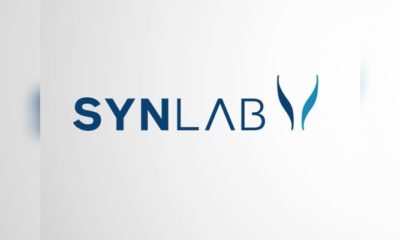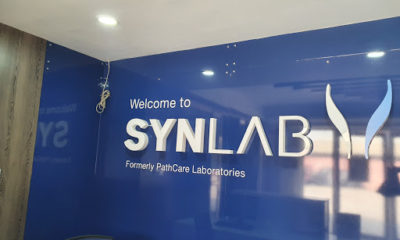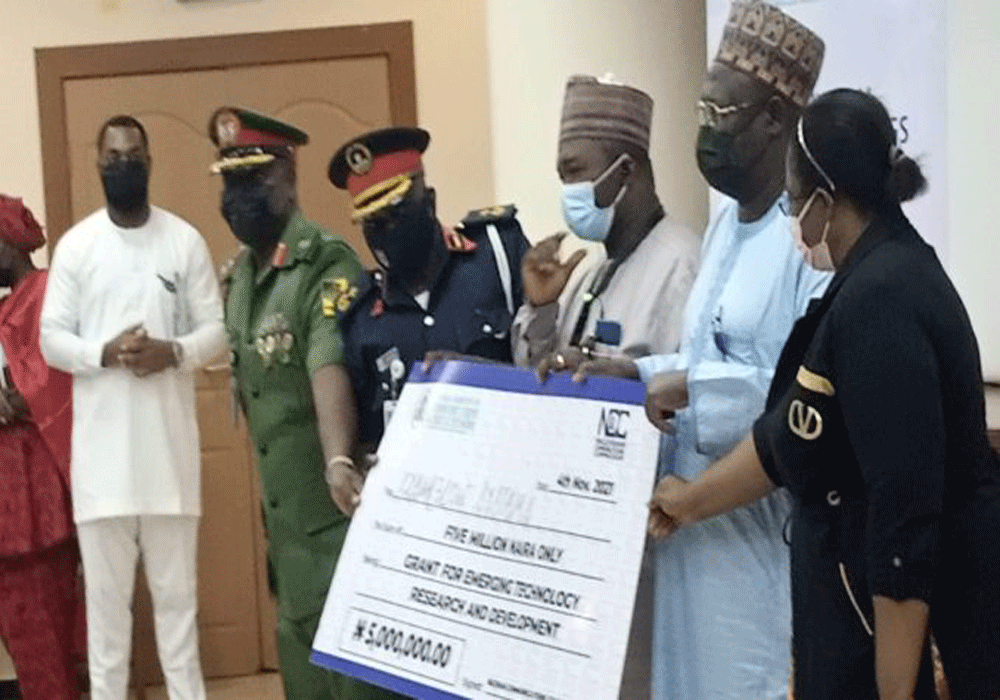Health
The Importance of Electronic Health Records in Medical Diagnostics

Electronic Health Records (EHRs) have revolutionized the healthcare industry, streamlining processes, improving patient care, and enhancing the accuracy and efficiency of medical diagnostics. This article explores the critical role EHRs play in diagnostics, with a specific focus on examples from SYNLAB Nigeria, a leading medical diagnostics company.
Electronic Health Records (EHRs) are digital versions of patients’ paper charts. They contain comprehensive and real-time records of patients’ medical histories, including diagnoses, medications, treatment plans, immunization dates, allergies, radiology images, and laboratory test results. EHRs facilitate the sharing of patient information across various healthcare settings, ensuring that doctors, specialists, and other healthcare providers have access to the most accurate and up-to-date information.
The implementation of EHRs at SYNLAB Nigeria has provided significant benefits to their customers, enhancing their overall healthcare experience. As part of efforts in promoting excellent patient care and in line with SYNLAB’s mission of providing actionable diagnostic information for a healthier life, let’s explore some applications of EHRs in the field of medical diagnostics.
1. EHRs ensure that patient data is accurately recorded and easily accessible. This reduces the risk of errors associated with manual data entry and ensures that patient information is readily available to healthcare providers at any time, facilitating faster and more accurate diagnoses. This means that customers receive their test results quickly and accurately. With all patient data digitally recorded and integrated, the risk of errors is minimized, and results are processed and delivered faster at SYNLAB Nigeria. This timely access to information allows for prompt medical decisions and interventions.
Read Also: Health Experts Warn Against Unhealthy Vegetable Oils, Cite Increased Risk Of Heart Attacks
2. EHRs enable seamless sharing of patient information among different healthcare providers. This ensures that all relevant medical history and test results are available to doctors and specialists, leading to more informed decision-making and better patient outcomes. Improved coordination of care also means that EHRs facilitate better communication among healthcare providers. When patients visit SYNLAB for diagnostic tests, their healthcare providers can access the results directly through the patients’ portal, made possible because of EHR. This ensures that doctors have all necessary information to provide accurate diagnoses and appropriate treatments.
3. Because of EHRs patients have better access to their health information. Patients can view their test results online, schedule appointments, and communicate with their healthcare providers. This increased engagement empowers patients to take a more active role in their health management. SYNLAB Nigeria’s EHR system allows customers to access their personal health records online. Patients can log in to a secure portal to view their test results, track their medical history, and download reports. This convenience empowers patients to stay informed about their health and make more educated decisions.
4. EHRs at SYNLAB Nigeria ensure that patient information is securely stored and protected. Robust encryption and security protocols are in place to safeguard sensitive health data, giving customers peace of mind regarding the privacy and security of their medical information.
5. Aggregated data from EHRs can be used for research and analysis, identifying trends and patterns in patient health. This data-driven approach supports ongoing improvements in diagnostic accuracy and the development of new diagnostic tools and procedures.
The integration of Electronic Health Records at SYNLAB Nigeria exemplifies the transformative impact of EHRs on medical diagnostics. By improving data accuracy, streamlining workflows, enhancing patient engagement, and facilitating better coordination of care, EHRs would continue to play a vital role in advancing the quality and efficiency of healthcare services. As technology continues to evolve, the importance of EHRs in medical diagnostics will only grow, paving the way for more innovative and effective healthcare solutions.
About SYNLAB
• SYNLAB Nigeria is a member of the SYNLAB group, with presence in over 30 countries in four continents. The organization has over 30 active locations across Nigeria and has been ISO 15189 certified since 2006.
• SYNLAB Group is the leader in medical diagnostic services and specialty testing in Europe. The Group offers a full range of innovative and reliable medical diagnostics to patients, practicing doctors, hospitals and clinics, governments and corporates.
• Providing the leading level of service within the industry, SYNLAB is the partner of choice for routine and specialty diagnostics in human and veterinary medicine. The Group continuously innovates medical diagnostic services for the benefit of patients and customers.
• SYNLAB holds leading positions in most markets, regularly reinforcing the strength of its network through a proven acquisition strategy.
• More information can be found on www.synlab.com,
Health
Global Experts Tackle Stroke Management Crisis With Training In Asaba

Experts consider that stroke is a growing health crisis in Nigeria, affecting thousands of lives every year.
To tackle this challenge, the World Stroke Organization (WSO), Stroke Action Nigeria, Federal Medical Centre (FMC) Asaba, Asaba Specialist Hospital (ASH), and FMC Onitsha joined forces for an intensive four-day training program. Their mission? To equip healthcare workers with the skills to prevent, detect, and treat strokes more effectively.
The program brought together leading stroke specialists from around the world, including WSO President Prof. Jeyaraj Pandian, former WSO President Prof Sheila Martins, Dr. Rita Melifonwu, CEO of Stroke Action Nigeria and Board Member of the World Stroke Organisation, and other experts from Nigeria, India, Canada, Rwanda, and the UK. Through hands-on training and expert-led sessions, healthcare workers learned best practices for recognizing stroke symptoms, responding in emergencies, and providing life-saving care.
ALSO READ: 2027: Okpebholo Assures Tinubu With Snatch Of 17 LG Chiefs From PDP
Dr. Emmanuel Ezunu, Chief Consultant Neurologist at FMC Asaba, stressed the urgency of the training, saying, “Stroke is the leading cause of disability worldwide and the second leading cause of death. We all need to work together to reduce the burden of stroke. This training is a crucial step to ensure our health workers are well-equipped to handle every stage of stroke care.”
The training sessions took place simultaneously in multiple locations, including FMC and ASH in Asaba as well as in Onitsha, Anambra. Dr. Francis Ugoeze, Lead for the Research Study Recruitment and Implementation Team, warned about the rising risks among young people due to poor lifestyle choices. “It’s important to watch what we eat, avoid junk food, smoking, and hard drugs, and stay active,” he advised.
Dr. Melifonwu emphasized that stroke is not just a health crisis but a preventable one. “One in four adults over 25 is at risk. We need more awareness and lifestyle changes to reduce stroke cases,” she said. She also shared plans to establish ‘Life After Stroke’ centers in Nigeria, offering much-needed support for survivors, especially those struggling financially.
Dr. Chiamaka Okereke, a consultant neurologist and member of the research team, highlighted how these efforts are about more than just education—they’re about saving lives. “If more people recognize stroke symptoms early and seek medical help immediately, we can prevent many unnecessary deaths and disabilities,” she explained.
Experts at the event also called on the government to take action by increasing public awareness and investing in stroke care facilities. They emphasized the need for acute stroke units and post-stroke rehabilitation centers to provide patients with the care and support they need to recover.
This initiative represents a major step toward a future where stroke is no longer a leading cause of disability and death in Nigeria. With greater awareness, improved healthcare training, and better facilities, countless lives can be saved.
Health
Nigeria Strengthens Airport Screenings Amid Spread Of China’s HMPV Virus

The Nigerian government has increased surveillance at major international airports in response to the outbreak of Human Metapneumovirus (HMPV), recently discovered in China and now spreading to several countries, including India, Hong Kong, Malaysia, and Kazakhstan.
Port health officers have begun screening arriving passengers for symptoms of the virus, following a directive from the Minister of Health, Muhammad Ali Pate.
According to a source at Murtala Muhammad International Airport (MMIA), Lagos, “There is no cause for alarm as the Port Health Service has been mandated to start screening the passengers, and we are not taking anything to chance.”
The Human Metapneumovirus has sparked global concern after over 5,000 hospitalisations were reported in the United Kingdom due to respiratory infections linked to the virus.
READ MORE: Speed Darlington Sues IGP For N300M Over Unlawful Detention
The Nigeria Centre for Disease Control and Prevention (NCDC) has issued an advisory to monitor global developments in collaboration with the Ministry of Health and Social Welfare. Dr Jide Idris, Director-General of the NCDC, stated, “We aim to provide timely, accurate information and guidance to keep the Nigerian public informed and prepared.”
The agency also debunked rumours that the World Health Organization (WHO) had declared HMPV a Public Health Emergency of International Concern (PHEIC), urging the public to disregard such claims.
Screenings have commenced at key airports, including MMIA, Lagos, and Nnamdi Azikiwe International Airport, Abuja. Despite the heightened precautions, the Nigeria Civil Aviation Authority (NCAA) has yet to issue a formal circular to airlines on mandatory passenger checks.
The surge in respiratory infections globally has heightened pressure on health systems. In the UK alone, flu cases rose sharply over the holiday period, with over 5,000 hospitalisations reported by December 29, 2024. There has also been an increase in hospitalisations linked to COVID-19, norovirus, and RSV.
As global temperatures drop and respiratory infections continue to rise, Nigerian authorities remain vigilant, aiming to prevent the spread of HMPV within the country.
Health
Africa Leads Global Progress In HIV/AIDS Fight, Says WHO
Africa has made remarkable progress in reducing new HIV infections and AIDS-related deaths, according to the World Health Organization (WHO).
Dr. Matshidiso Moeti, WHO Regional Director for Africa, highlighted these achievements in her statement to mark this year’s World AIDS Day, themed “Take the Rights Path: My Health, My Right” on Friday.
READ ALSO: Atiku Gloats Over AUN’s Achievements Ahead Of 20th Anniversary
For the first time in 2023, the number of new HIV infections outside sub-Saharan Africa surpassed those within the region, underscoring Africa’s significant progress.
The continent is also a global leader in advancing the 95-95-95 UNAIDS targets aimed at ensuring 95% of people living with HIV know their status, 95% of those diagnosed are on treatment, and 95% of those treated achieve viral suppression.
“Seven countries have already achieved the targets, with the overall rating for the region currently at 90-82-76,” said Dr. Moeti. “About 21.3 million people are now on antiretroviral treatment, raising their life expectancy.”
Botswana and Namibia were recognized for achieving significant milestones in preventing mother-to-child HIV transmission, earning silver and bronze tier statuses, respectively, under WHO’s Path to Elimination of HIV initiative.
African countries are also adopting innovative prevention methods, including oral and long-acting injectable pre-exposure prophylaxis (PrEP) and the dipivefrine vaginal ring.
Dr. Moeti stressed that while these tools are vital, their impact depends on accessibility.
“The value of these innovations depends on their universal accessibility,” she stated, emphasizing the need for investments and policy reforms.
Dr. Moeti called for an end to stigma and discrimination, which she said continue to hinder progress.
“We have a collective obligation to protect human rights, specifically ensuring that health care is available to everyone, without any discrimination, regardless of their HIV status, background, gender, or where they live. Stigma and discrimination cannot be allowed to undermine the gains and impede our progress.”
While celebrating these advancements, Dr. Moeti noted that disease outbreaks across the region pose a challenge to already overburdened health systems.
She emphasized the importance of strong, integrated, and person-centered health care systems to meet the needs of vulnerable populations.
“Let’s take this opportunity today to acknowledge the progress, but to also renew our joint commitment to eliminating HIV.
By protecting everyone’s right to health, and reducing new HIV infections, we can achieve an AIDS-free generation and ensure the sustainability of the HIV response,” she urged.
Dr. Moeti also highlighted the crucial role of communities in shaping strategies to eliminate barriers to care.
“We must ensure their voices are heard,” she said, emphasizing that the collective efforts of governments, partners, civil society, health care providers, and communities are essential in the fight against HIV/AIDS.

















